Stripped Bare: A Few of Paul Thomas Anderson’s Most Devastating Portraits of Human Nature
Warning: This article contains spoilers
From the furious ambition of oil magnates to the quiet desperation of lonely souls, Paul Thomas Anderson’s films plunge into the dissonant symphony of the human experience with unflinching intensity. Across his eclectic filmography, Anderson crafts narratives that orbit around deep emotional truths, both exhilarating and unsettling. The hunger for connection, the burden of legacy, and the corrosive pull of obsession — whether in the drug-fueled haze of Boogie Nights, the religious fervor of The Master, or the existential silence of There Will Be Blood — reveal to his audience the rawness of the human experience. His characters often drift through fractured families or surrogate tribes, clinging to found families in the absence of real ones. From pornographers forming a makeshift clan in the San Fernando Valley to a cult masquerading as spiritual salvation, Anderson’s characters yearn for meaning in a world that rarely offers clear answers. Their pain is deeply personal, yet rendered in operatic scale, blurring the line between the intimate and the epic. Through languorous camera movements, hypnotic scores, and unrestrained performances, Anderson excavates the emotional sediment beneath the surface of his characters. His worlds are populated by flawed, often morally ambiguous individuals who are simultaneously monstrous and irrefutably human. Power dynamics play out like ritualistic dances, revealing the fragility of ego and the violence simmering beneath suppressed emotions. Yet amid the loneliness and dysfunction, there are moments of startling grace. A trembling hand held out in forgiveness or a gaze that says what words cannot invite viewers into exposed emotional spaces, not to judge, but to witness the absurdity, tragedy, and beauty of being human. In his universe, the human condition is a kind of unsolvable riddle, one that loops through time, echoing across eras and genres. And as we await Anderson’s newest film, One Battle After Another, which hits theaters September 26th, we can reflect on some of the most powerful moments of cinema Anderson has given us: moments that hold up a mirror to our benevolent and horrific nature, and the scenes ahead are some of the most memorable emotional scenes film has delivered in years.
Amber Waves and Rollergirl (Boogie Nights)
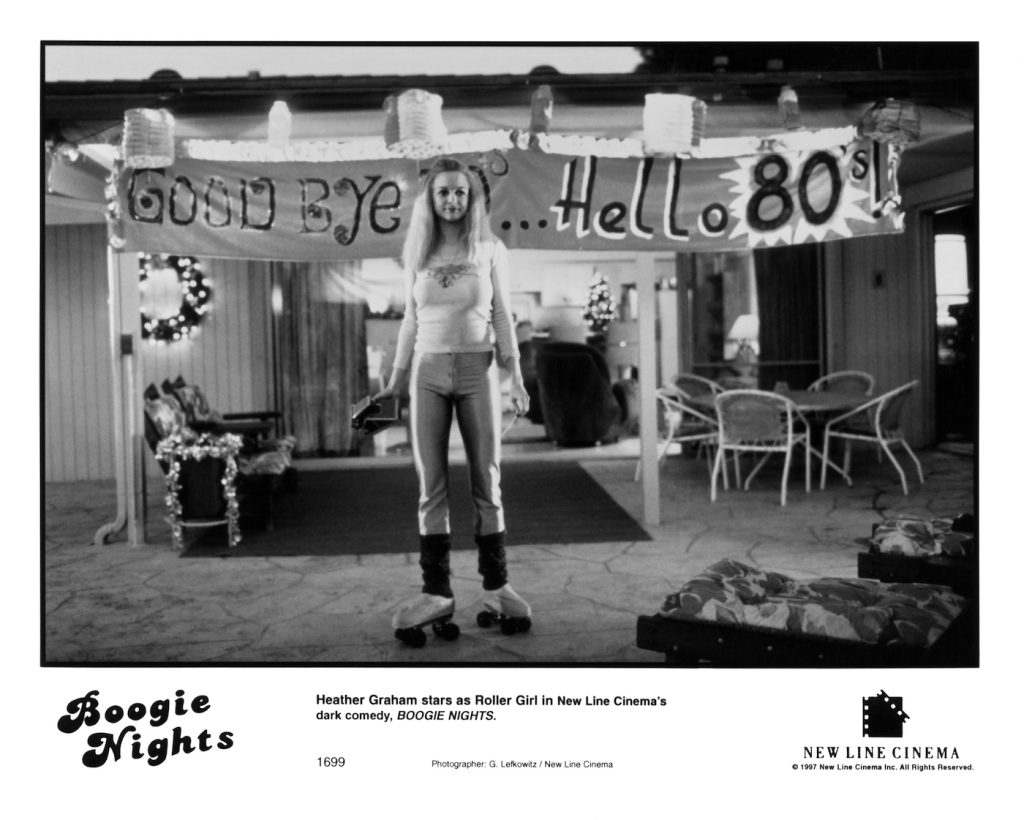
In 1997’s Boogie Nights, Anderson’s second feature about a naive young man being consumed by the trappings of the porn industry in the 1970s and 80s, the frenzy of cocaine and disco lights fades sporadically to reveal the deep emotional wreckage beneath the film’s characters. As Amber Waves (Julianne Moore), with her maternal poise, and Rollergirl (Heather Graham), who sails through most of the film with a party-girl bravado, sit cross-legged, high and giddy, a hauntingly tender moment emerges. Rollergirl’s request, “I want you to be my mom, Amber. Will you be my mom?” floats out, a desperate plea from a girl lost in a world that failed to nurture her. Behind her glittering and coke-addled eyes is a longing for safety, structure, and for someone to care when the cameras stop rolling. Amber, who has already lost custody of her own son to the cold judgment of the courts, sees in Rollergirl not only a surrogate child, but a mirror of her own failure to belong and to be loved without conditions. It’s a moment of delusion and realness colliding. In this exchange, we find two desperate people clinging to a fantasy family built from brokenness, unsustainable and erratic, grasping for each other like driftwood in a storm.
Scotty’s Rejection (Boogie Nights) –
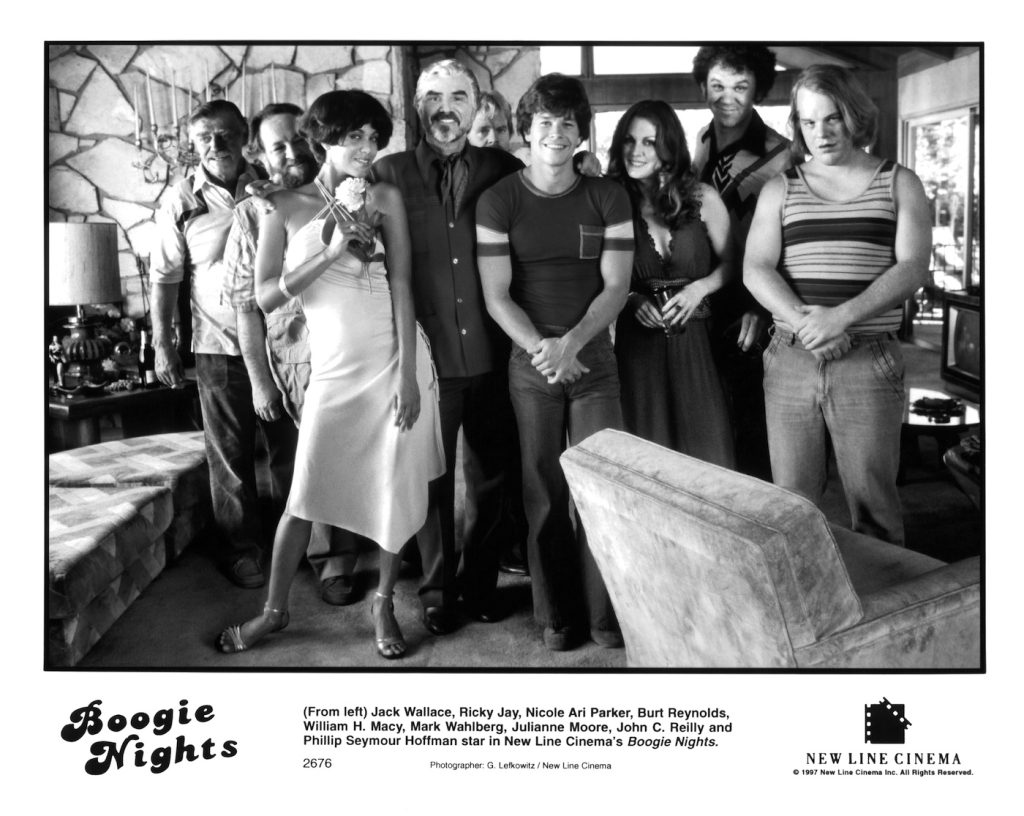
It’s difficult to extract the most powerful scene in a film filled with moments in which our characters’ vulnerabilities are so mercilessly exposed, but this one hits hard. In one of many devastatingly relatable scenes from Boogie Nights, Scotty, played with discomfiting awkwardness by Philip Seymour Hoffman, tries to kiss Dirk Diggler (Mark Wahlberg). It’s New Year’s Eve, and the party is in full swing. However, for Scotty, the celebration masks a storm of unrequited longing. Dirk is the new golden boy of porn with feathered hair, sculpted features, and, of course, his “one special thing.” He is Scotty’s idol, crush, and emotional undoing. When Scotty, nervously showing off his new car in a desperate bid for attention, leans in for a kiss, Dirk recoils, confused, embarrassed, and repulsed. The rejection is swift, but what lingers is Scotty’s quiet, gutting collapse, repeating “I’m a fucking idiot” in the driver’s seat. It’s one of the film’s most poignant scenes, belying the glamour of our character’s surroundings, to reveal the aching human need for love, recognition, and belonging in a world that confuses performance for connection.
Informal Processing (The Master) –
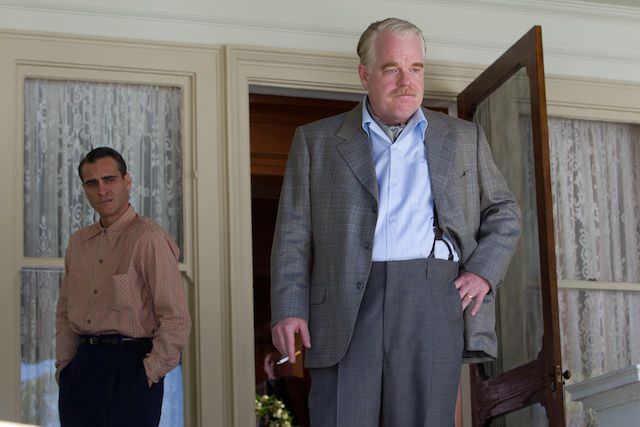
In The Master (2012), the informal processing scene, which feels much more like an interrogation, hums with an almost intolerable intensity, drawing us deep into the strange gravitational pull between Lancaster Dodd (Philip Seymour Hoffman), the charismatic, self-anointed prophet of a burgeoning philosophical movement, and Freddie Quell (Joaquin Phoenix), an unstable, war-damaged drifter teetering on the edge of sanity. Seated across from each other in a dimly lit room, Dodd, with all the poise and disquieting focus of Hannibal Lecter, bombards Freddie with a relentless stream of probing questions, commanding him to answer without blinking or hesitation. Every moment brims with unspoken danger as Dodd repeatedly asks invasive personal questions about Freddie’s mental health, predilection for violence, and sexual history, which includes an admission of sexual intercourse with his own aunt. Freddie tries to keep up, fidgeting like a cornered animal, while Dodd leans in with paternal calm, sensing something wild and pure in Freddie that he can either harness or destroy. What unfolds is less a conversation and more a psychic wrestling match, a wordless dance of dominance and vulnerability, where belief and control are the ultimate stakes.
Pharmacy Breakdown (Magnolia) –
In Magnolia (1999), the pharmacy scene is an exposed, unflinching glimpse into the unraveling psyche of Linda Partridge, played by Julianne Moore. Linda is a woman drowning in grief, guilt, and the unbearable weight of regret. Having married a much older man for money and now watching him die, she finds herself, too late, genuinely in love with him and emotionally unmoored. When she charges into the pharmacy, desperate for an arsenal of medications, the polite suspicion of the pharmacists feels like an assault. Her tightly coiled nerves snap, and in a burst of anguish and fury, she erupts. “I’m in pain!” Outwardly, this is a justification, but we understand it as a primal confession. It’s a meltdown charged with shame, heartbreak, and the desperate need to be seen not as a gold-digger, but as a woman who has made a tragic mistake and is now paying for it in full. Moore’s performance is shattering and unforgettable, turning an ordinary setting into the stage for a soul laid bare.
Reynolds Drinks the Tea (Phantom Thread) –
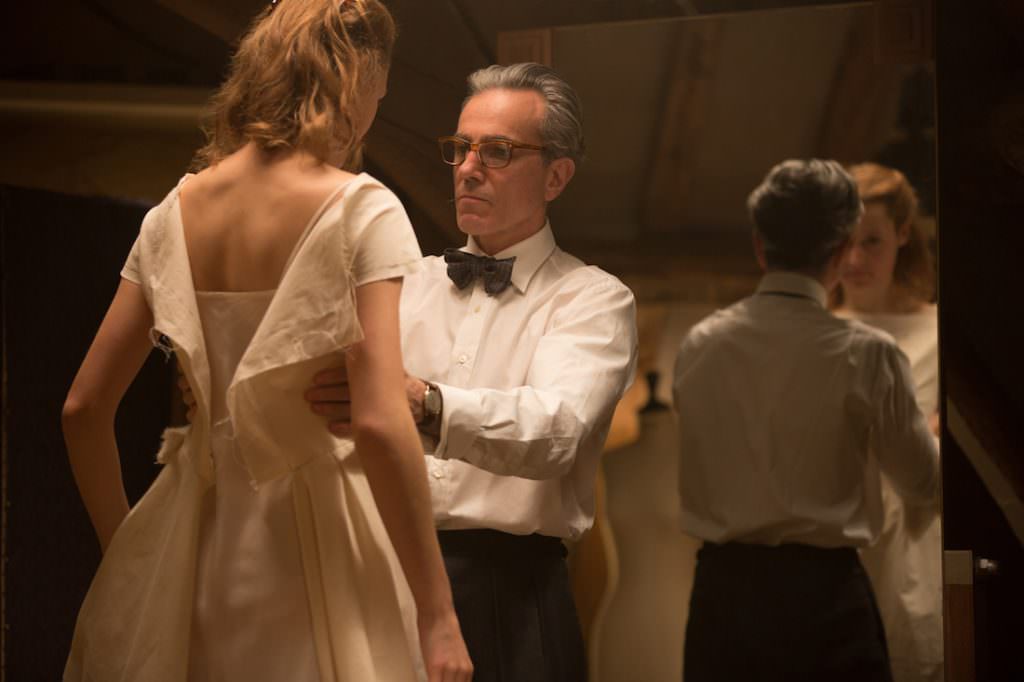
Credit : Laurie Sparham / Focus Features
In one of the most unsettling turns of 2017’s Phantom Thread, the veil lifts on the twisted intimacy between Reynolds Woodcock (Daniel Day-Lewis) and Alma (Vicky Krieps), as he knowingly sips the poisoned mushroom tea she’s prepared. We watch his eyes locked with hers, a near-smile playing at the corners of his lips. Until this point, well into the film, Reynolds has ruled his pristine, couture world with tyrannical precision. We understand him to be a man with emotional walls as high as his standards for garment-making. At this moment, however, he is sickened not just by the mushrooms but by the weight of his own perfectionism. What Alma brings to him is a perverse offering, a mutual recognition that their love is sacrificial and ritualistic, not soft, not gentle. Alma’s poisoning is an intimate negotiation, a dark pact in which illness becomes a language of care, control, and submission. Reynolds, craving the vulnerability he cannot access on his own, allows her to break him down so she can build him back up on her terms. The moment is grotesque, tender, erotic, and absurdly romantic, revealing their love as a carefully stitched arrangement of pain, devotion, and mutual fantasy.
Final Confrontation (There Will Be Blood) –
How could one discuss the most powerful moments in Paul Thomas Anderson’s films without mentioning the final scene in There Will Be Blood? In the film’s final minutes, we see the ultimate confrontation between two men whose lives have been fueled by abject, narcissistic hunger, as the decades-long tension between Daniel Plainview (Daniel Day-Lewis) and Eli Sunday (Paul Dano) comes to a brutal climax. Set in the cavernous bowling alley of Daniel’s estate, now a decaying monument to his isolation and wealth, the confrontation exposes the emotional and moral rot that has festered between them. A desperate and diminished Eli seeks Daniel’s help, only to be humiliated and ultimately destroyed. Daniel, dangling the carrot of financial salvation before Eli, forces him to repeat, “I am a false prophet, and God is a superstition,” until his timbre reaches the fever pitch of his own sermons. Daniel then reveals that Eli’s proposition is worthless, delighting in Eli’s weakness and haste to betray his purported faith. The exchange lays bare their mirrored narcissism. Both men are manipulative, performative, and obsessed with power, using faith and capitalism as tools of domination. Yet Daniel, now consumed by misanthropy, alcoholism, and madness, holds a deeper contempt for Eli, seeing him as a fraud and a petulant parasite who once dared to best him. In the film’s final violent moments, Daniel murders Eli by bludgeoning him with a bowling pin. This is less an act of passion than of finality, a declaration that the game of pride and vengeance is over. Daniel’s last line, “I’m finished,” is not just an indicator to his butler but a pronouncement signaling the end of the spiritual and emotional war that has defined his life.
Paul Thomas Anderson has crafted so many moments of cinematic mastery throughout his storied career. He has, with his incredibly flawed and undeniably human characters, reflected to us the nuance of the human emotional experience, and his newest film, One Battle After Another, promises to be a new mirror through which we are shown our very nature. Look for it in theaters September 26th.
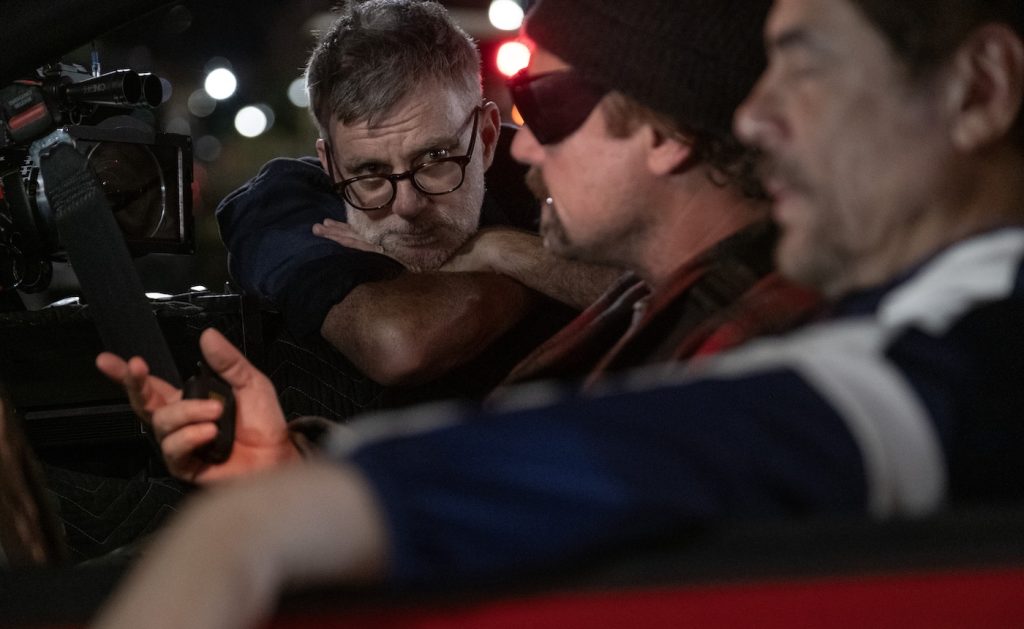
Featured image: Caption: (L-r) LEONARDO DI CAPRIO and Director/Writer/Producer PAUL THOMAS ANDERSON on the set of “One Battle After Another.” A Warner Bros. Pictures Release. Photo Credit: Merrick Morton



